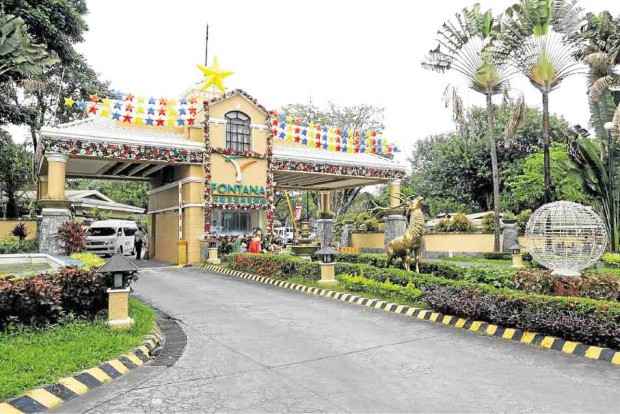Gaming firm at Fontana under scrutiny since 2014

The Fontana Leisure Parks and Casino is among the popular destinations in the Clark Freeport. —PHOTO COURTESY OF CDC
CLARK FREEPORT—Before the Bureau of Immigration (BI) rounded up more than 1,300 Chinese nationals employed at the Fontana Leisure Parks and Casino here on Nov. 24, the state-owned Clark Development Corp. (CDC) in 2014 was already scrutinizing the status of an online gaming firm in that tourism estate, according to documents obtained by the Inquirer.
The CDC, which leases out lands in this former US military base, was trying to determine if there was need to honor the interactive gaming license of Next Games Outsourcing Inc. (NGOI) operating at Fontana that was issued by the Cagayan Economic Zone Authority (Ceza) or to require NGOI to get a new permit from the Philippine Amusement and Gaming Corp. (Pagcor).
NGOI is a sublessee of Fontana Development Corp. (FDC), which leased 300 hectares here from CDC. Before FDC, the original lease was signed in 1997 by RN Development. This was bought by Robin Tan who, in turn, sold it to Macau gambling tycoon Jack Lam, who owns FDC.
NGOI, headed by its president, Neil Martin, reported that their enterprise involved “business process outsourcing [BPO] such as computer data processing, inbound and outbound contact/call center services, telemarketing services such as market research, sales and customer relations services by phone or other information technology services related to the gaming industry.”
NGOI rented 1,951.22 sq m in an area called “R2” for four years from May 26, 2014 to April 30, 2018, and 3,049.08 sq m in “R6” for 1.33 years from Jan. 28, 2016 to April 14, 2017. It reported hiring 11 locals and 1,456 foreigners.
Article continues after this advertisementBlacklist
Article continues after this advertisementThe stockholders of NGOI did not include Lam. Apart from Martin, they are Philip Gocor, Emma Melendres, Helen Grace Deala and Hennessy Lim Chua. Their authorized capital stock was P10 million.
But then CDC president and chief executive officer Arthur Tugade, now transportation secretary of the Duterte administration, had already obtained a resolution from the Subic-Clark Alliance Development Council (SCADC) on May 22, 2014, authorizing the BI to “blacklist unaccounted foreign nationals of NGOI.”
Tugade also regulated the employment of foreigners in Clark and Subic free ports, using two joint memorandum orders issued on Feb. 3, 2009 and Oct. 30, 2014.
These directives required the BI to issue working visas and the Department of Labor and Employment (DOLE) alien employment permits. CDC and Subic Bay Metropolitan Authority were to endorse applications to the DOLE and BI.
On Jan. 14, 2015, CDC asked the DOLE to issue a policy regarding “numerical limits” to be imposed on firms employing foreigners. The DOLE said there was no limit set.
On Feb. 11 this year, CDC and the BI visited the premises of NGOI. On March 26, NGOI was given 30 days to report the whereabouts of its Chinese workers.
The results: the visas of 72 unaccounted Chinese were canceled and the status of 565 Chinese were downgraded to tourists.
The CDC imposed more requirements for the processing of working visa applications such as job descriptions, floor-to-manpower ratio and random inspections.
A random inspection on June 1 counted 659 Chinese. At least 229 were not accounted for but NGOI had claimed that these foreigners were on leave or were out of the country.
In October, BI and CDC denied 600 new applications for working visas.
At the same time, CDC asked the Office of the Government Corporate Counsel (OGCC) to decide “whether or not Ceza is allowed to issue online gaming license and/or accreditation to BPO companies operating outside its jurisdiction [like the Clark Freeport].”
The OGCC rendered this opinion: “Its charter did not give Ceza authority to issue accreditation or license to entities that will operate outside the Ceza territorial jurisdiction.”